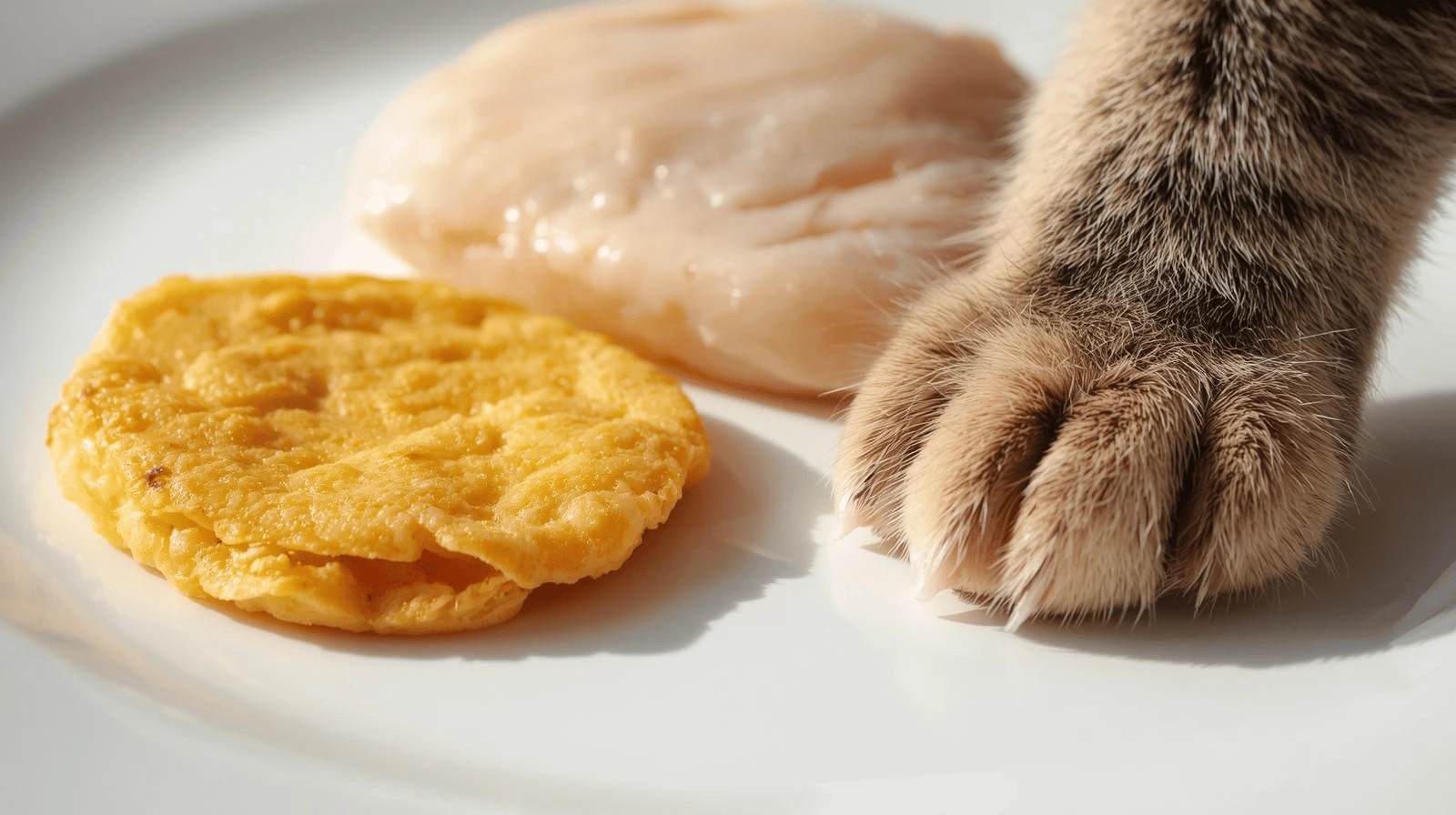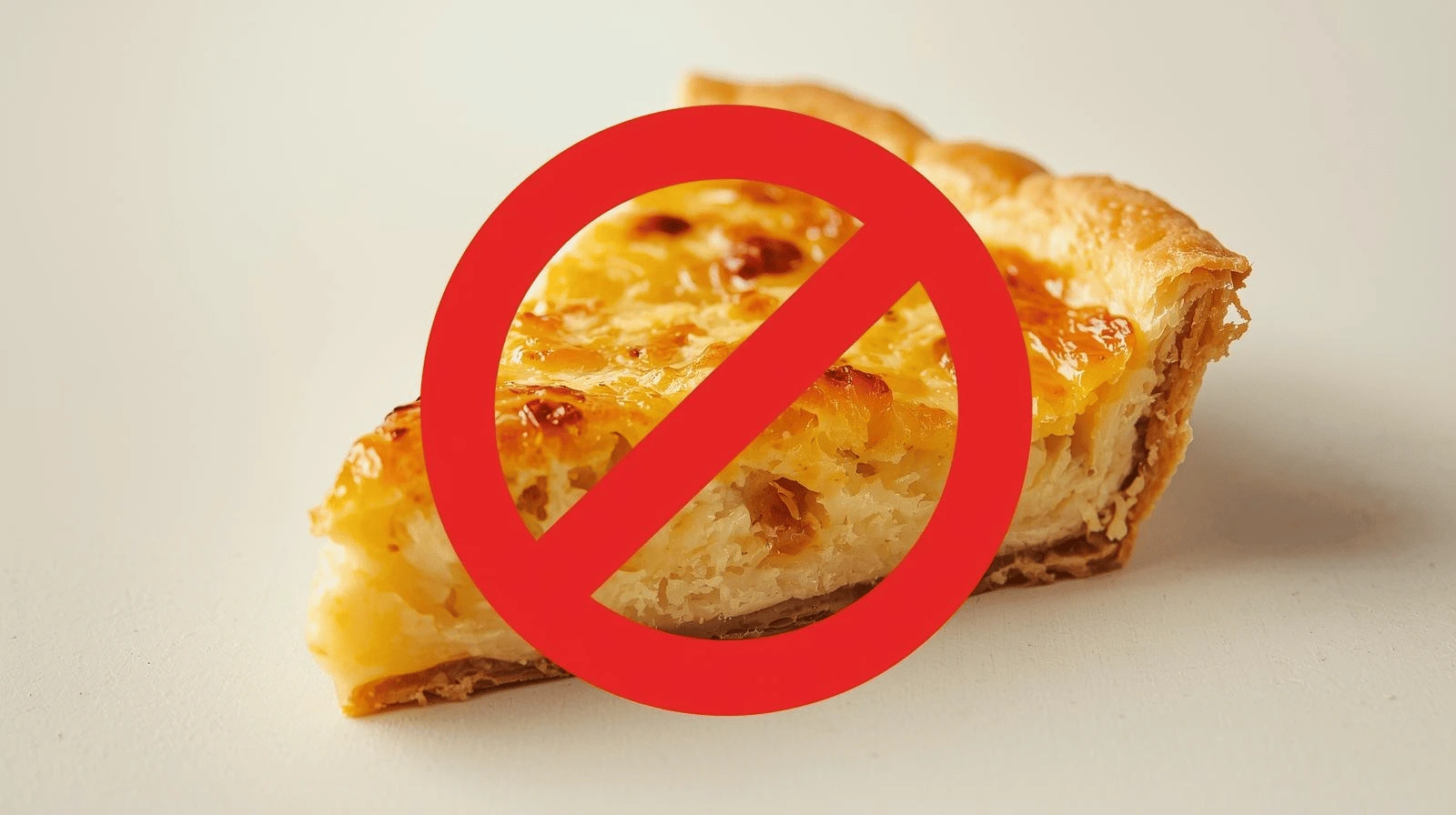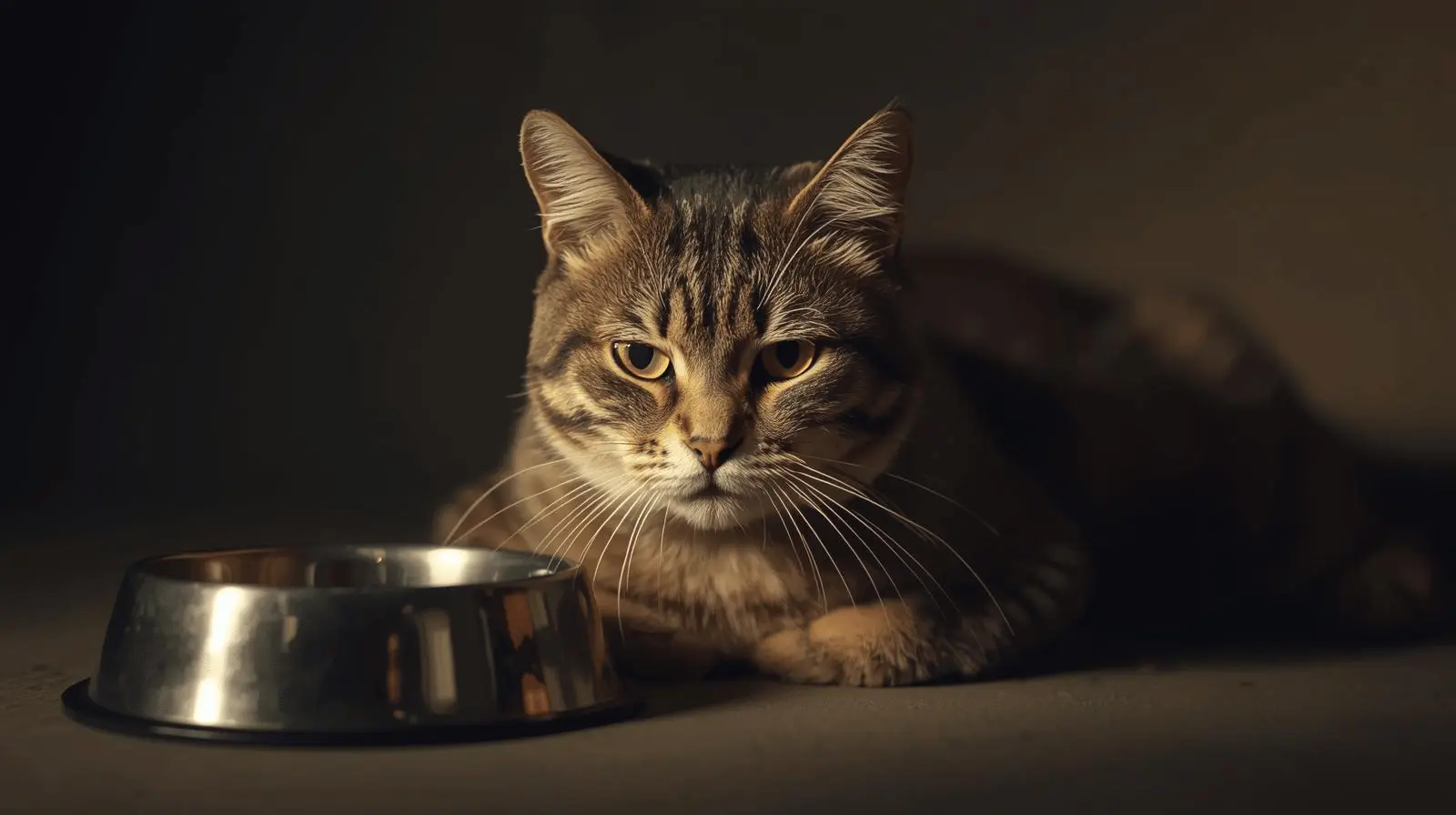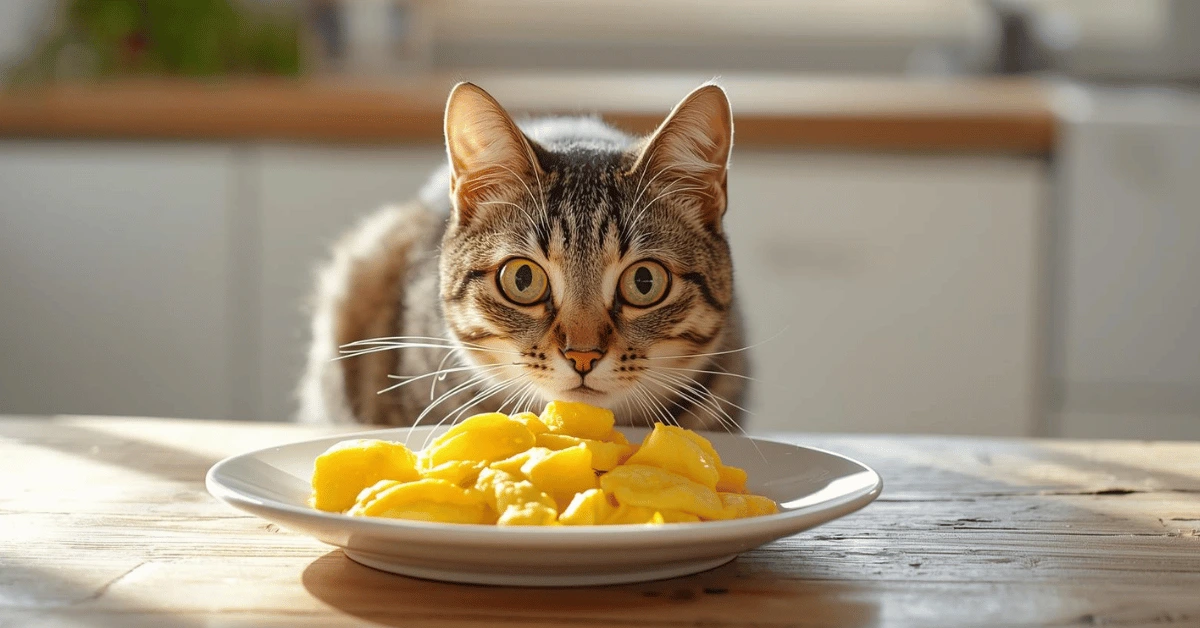Cats have a reputation for being curious about everything, especially the food on your plate. If you enjoy eggs in the morning or desserts at night, your cat may beg for a taste. But as a pet parent, you need to know: which human foods with eggs are safe for cats, and which should be avoided?
Why Eggs Matter in a Cat’s Diet
Eggs are often called a “superfood” for humans, and for cats, they can offer unique benefits — but only under the right circumstances.
Benefits of Eggs for Cats
Eggs are rich in protein and amino acids that cats need for strong muscles and energy. They also contain vitamins A, D, and B12, plus healthy fats that can support overall wellness.
Risks to Keep in Mind
Raw eggs may carry harmful bacteria, and egg whites contain a protein called avidin that blocks vitamin absorption. Egg dishes with salt, dairy, or seasonings can upset a cat’s stomach or even be toxic.
Related➡️Should Cats Eat Raw Eggs? Vet-Backed Insights
Human Foods With Eggs That Cats Can Eat
Some egg-based foods are simple and safe when given in moderation. These can make occasional treats for your cat.
Plain Cooked Scrambled Eggs
Scrambled eggs can be safe if they’re cooked without butter, milk, or spices. A teaspoon-sized bite is enough for a protein boost. Let them cool before serving — cats prefer food closer to room temperature.
Hard-Boiled Eggs as Simple Snacks
Boiled eggs are fully cooked and bacteria-free. Both yolk and white are fine in small amounts. Slice into tiny pieces and offer sparingly, no more than once or twice a week.
Related➡️Why Do Cats Sleep So Much? The Science Behind Cat Naps
Other Cooked Egg Dishes That Work

Eggs often show up in homemade recipes. A few can be safe if prepared carefully.
Basic Omelets Without Additives
A plain omelet, made with only eggs, is generally safe. Skip cheese, vegetables, and seasonings. Cats don’t need extras — just the egg itself offers enough nutrition.
Eggs Combined With Lean Meat
If you’re making boiled chicken or turkey, a little egg added in can create a protein-rich snack. This combination mimics the natural carnivorous diet cats thrive on.
Raw Eggs Are Always Unsafe
Some people enjoy raw eggs, but cats should never have them.
Why Raw Eggs Are Risky
Raw yolks and whites can contain Salmonella or E. coli. These bacteria may cause vomiting, diarrhea, and serious illness in cats.
The Problem With Avidin
Raw egg whites also contain avidin, a protein that interferes with biotin absorption. Over time, this can affect a cat’s coat and skin health. Cooking destroys avidin, making eggs safe only when fully cooked.
Related➡️Can Cats Eat Catnip? Benefits, Risks, and Safe Usage
Egg Dishes With Toxic Ingredients
Certain foods combine eggs with ingredients that are harmful to cats.
Eggs Mixed With Onion or Garlic
Onions, garlic, and chives are all toxic to cats. Even in small amounts, they can damage red blood cells and lead to anemia. Any egg dish seasoned with these should never be shared.
Spiced or Seasoned Egg Recipes
Scrambled eggs made with salt, pepper, or herbs are not suitable for cats. Their digestive systems are sensitive, and added spices may cause stomach upset.
Dairy-Based Egg Meals

Egg dishes with milk, cream, or cheese may sound harmless, but most cats don’t digest dairy well.
Custards, Quiches, and Sauces
These recipes often contain heavy cream and cheese. Since many cats are lactose intolerant, such foods can lead to diarrhea, bloating, and discomfort.
Why Cheese Isn’t Cat-Friendly
While cheese contains protein, it’s high in fat and lactose. Feeding it with eggs may cause more harm than good. It’s best to avoid this combination altogether.
Related➡️6 Cat Feeding Mistakes Most Owners Make
Greasy or Fatty Egg Preparations
Cats don’t process excess fats as well as humans.
Fried Eggs in Butter or Oil
Eggs fried in oil, butter, or grease are unhealthy for cats. High fat intake can lead to digestive problems and increase the risk of pancreatitis.
High-Fat Egg Dishes
Anything loaded with fat — from rich breakfasts to heavy sauces — should be avoided. Cats need protein, not unnecessary oils.
Processed Egg Foods Cats Should Skip
Eggs appear in many processed foods, but these often contain hidden dangers.
Egg Salad and Mayonnaise Mixes
Egg salad may seem harmless, but mayonnaise adds fat and preservatives. Onion powder and extra salt are also common in recipes, making them unsafe.
Baked Goods and Desserts With Eggs
Cookies, cakes, and brownies all contain eggs, but they also include sugar, butter, and sometimes chocolate. Since chocolate is toxic and sugar offers no benefit, these foods should never be shared with cats.
Related➡️6 Reasons Why Your Cat Sneezes All the Time
Other Egg Dishes to Watch Out For
- Deviled eggs: Often loaded with mayo and seasonings.
- Egg noodles: Safe if plain, but sauces may contain onions or spices.
- Egg rolls: Contain fried oil and vegetables unsafe for cats.
- Breakfast burritos: Usually seasoned, fatty, and unsafe.
How Often Can Cats Eat Eggs?
Even safe foods can cause problems if given too often. Eggs should be treated as an occasional snack rather than a daily addition.
- Frequency: Once or twice a week is enough.
- Portion size: A teaspoon or two of cooked egg is plenty.
- Balance: Eggs should not replace complete cat food, which contains essential nutrients like taurine.
Overfeeding eggs may lead to weight gain or digestive issues. Keeping portions small ensures your cat enjoys the benefits without the risks.
Signs Your Cat Shouldn’t Eat Eggs

Not every cat tolerates eggs the same way. Some may have allergies or sensitive stomachs. Knowing what to watch for helps you act quickly if something’s wrong.
Possible Reactions After Eating Eggs
- Vomiting or diarrhea
- Itchy skin or excessive scratching
- Lethargy or lack of appetite
When to Call the Vet
If symptoms persist beyond a day, or if your cat shows signs of severe reaction (such as difficulty breathing), contact your veterinarian immediately.
Related➡️Why Do Cats Meow at Night? 4 Fascinating Explanations
Quick Safety Checklist: Cats and Eggs List
For busy cat owners, here’s a simple reference guide.
Safe in Moderation
- Scrambled eggs (plain)
- Boiled eggs (yolk + white)
- Plain omelets
- Eggs with plain chicken or turkey
Unsafe for Cats
- Raw eggs
- Eggs with onions, garlic, or spices
- Dairy-based egg recipes
- Fried or greasy eggs
- Egg salad and baked desserts
Balancing Human Foods and Cat Nutrition
Remember, eggs should never replace your cat’s main diet. High-quality cat food is specially formulated to meet their needs, while eggs should remain an occasional supplement. For more guidance, visit the ASPCA’s list of unsafe foods for pets.
By knowing which human foods cats can eat and which they cannot, you can keep your feline both happy and safe.

2 thoughts on “10 Egg-Based Dishes Cats Can or Can’t Eat Safely”